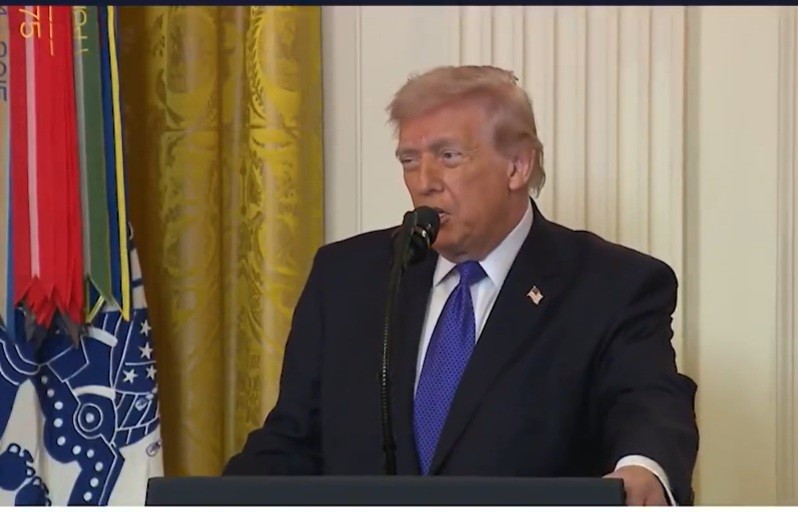US Senate advances bill to end 40-day government shutdown, restore federal services
Washington/IBNS: After a gruelling 40 days of halted services, delayed aid, and widespread disruption, the U.S. Senate on Sunday took a crucial step toward reopening the federal government.
Lawmakers advanced a House-passed measure that would fund federal operations until January 30, incorporating a broader spending package that covers three full-year appropriations bills.
The procedural vote passed 60–40, just clearing the threshold needed to overcome a filibuster.
The bipartisan move offers hope that the longest shutdown in recent history could soon come to an end, restoring normalcy for millions of Americans impacted by the funding impasse.
“It looks like we’re getting very close to the shutdown ending,” President Donald Trump said at the White House shortly before the vote, expressing cautious optimism about a resolution.
A deal shaped by bipartisan negotiations
The Senate’s progress follows intense behind-the-scenes talks between Republicans and a group of moderate Democrats who resisted their party’s leadership stance.
Under the compromise, Republicans agreed to schedule a December vote on extending subsidies under the Affordable Care Act (ACA) — a major Democratic priority.
These subsidies help low-income Americans afford private health insurance and are set to expire at the end of this year.
The procedural victory is a first step.
The Senate must still finalise the amendments, after which the bill will return to the House of Representatives for approval before heading to President Trump’s desk for signature — a process that could take several days.
Protecting federal workers and restoring pay
The proposed legislation also includes measures aimed at protecting federal employees.
It prohibits federal agencies from terminating workers until January 30, effectively halting Trump’s broader campaign to downsize the federal workforce.
Currently, the federal government employs around 2.2 million civilians, and an estimated 300,000 are expected to leave service by year’s end as part of ongoing restructuring efforts.
The bill further guarantees back pay for all affected federal workers, including members of the military, Border Patrol, and air-traffic controllers — many of whom have been without pay for over a month.
Leaders seek fast-track passage
Senate leaders are hoping to move quickly once the chamber reconvenes on Monday.
Republican leaders are seeking bipartisan consent to bypass procedural hurdles and bring the bill to a vote early in the week.
“It was a good vote tonight,” said Senate Majority Leader John Thune, after Sunday’s session. “Hopefully, we’ll get an opportunity tomorrow to set up the next votes. Of course, that’s going to take some cooperation and consent.”
If consensus cannot be reached, formal Senate rules could delay passage for several more days, potentially extending the shutdown into next weekend.
Democrats divided over the compromise
The agreement, reportedly brokered by Democratic Senators Maggie Hassan and Jeanne Shaheen of New Hampshire, along with Independent Senator Angus King of Maine, has revealed sharp divisions within the Democratic ranks.
“For over a month, I’ve made clear that my priorities are to both reopen government and extend the ACA enhanced premium tax credits. This is our best path toward accomplishing both,” Shaheen wrote on X (formerly Twitter).
However, Senate Minority Leader Chuck Schumer voted against the measure, reflecting broader frustration among Democrats who see the deal as a concession to Republican demands.
Representative Ro Khanna was among the most vocal critics, posting on X: “Senator Schumer is no longer effective and should be replaced. If you can’t lead the fight to stop healthcare premiums from skyrocketing for Americans, what will you fight for?”
Shutdown impact and growing urgency
Sunday marked the 40th day of the shutdown, which has taken a toll on everyday life across the country.
Federal workers have gone unpaid, national parks remain closed, and air travel disruptions have worsened due to staffing shortages in air traffic control.
With the Thanksgiving travel rush approaching later this month, airlines and passengers have been bracing for chaos if the shutdown continues.
“Temperatures cool, the atmospheric pressure increases outside and all of a sudden it looks like things will come together,” remarked Senator Thom Tillis of North Carolina, alluding to growing pressure on lawmakers to act.
Economic experts have warned that if the shutdown drags on much longer, U.S. growth could turn negative in the fourth quarter.
White House economic adviser Kevin Hassett, speaking on CBS’s Face the Nation, cautioned that continued disruptions to air travel and federal programs could significantly hurt the economy.
ACA subsidies dispute at the heart of the impasse
At the core of the standoff lies a fierce battle over Affordable Care Act subsidies. These subsidies have helped double enrollment to over 24 million Americans since their introduction in 2021.
Democrats want to extend them, while Trump and many Republicans argue for replacing them with direct cash payments to individuals.
In a Sunday post on Truth Social, Trump described the subsidies as a “windfall for health insurance companies, and a DISASTER for the American people.”
He reiterated his stance that funds should go directly to citizens to buy coverage independently. “I stand ready to work with both parties to solve this problem once the government is open,” he wrote.
Health analysts warn that without an extension, monthly insurance premiums could more than double in 2026, leaving millions vulnerable to coverage losses.
The ACA enrollment period, however, runs through January 15, giving Congress limited time to pass a fix.
A cautious step toward resolution
While Sunday’s vote does not immediately reopen the government, it represents a major step toward breaking the deadlock.
Both parties appear to recognise the mounting political and economic cost of the shutdown.
If lawmakers can maintain momentum, the federal government could reopen within days, bringing relief to furloughed workers and restoring critical public services.
But with partisan divisions still deep over healthcare funding and fiscal priorities, the path forward remains uncertain.
For now, however, Washington’s long gridlock shows its first real sign of easing — and millions of Americans are hoping that this time, the breakthrough holds.
IBNS
Senior Staff Reporter at Northeast Herald, covering news from Tripura and Northeast India.
Related Articles

India, Canada launch renewed strategic partnership, fast-track CEPA talks
New Delhi: Prime Minister Mark Carney and Prime Minister Narendra Modi on Monday announced an ambitious reset of the India–Canada relationship, agreeing to accelerate negotiations on Comprehensive Economic Partnership Agreement (CEPA) and deepen cooperation across energy, defence, artificial intelligence, talent mobility and trade.

'Whatever it takes, we'll do it': Donald Trump rules out timeline for Iran operations
US President Donald Trump on Monday said military operations against Iran could continue for as long as necessary, signalling no fixed timeline for an end to the campaign.

Three US F-15E jets shot down in 'friendly fire' incident by Kuwait as Iran war escalates
Three US Air Force F-15E Strike Eagle fighter jets were shot down in separate friendly-fire incidents by Kuwaiti air defences, the United States Central Command (CENTCOM) said on Monday evening.

Dubai, Abu Dhabi resume limited flight ops after days of airspace shutdown amid Iran war
Air travel across the United Arab Emirates is beginning a cautious return to normal after days of disruption triggered by escalating tensions between Israel and Iran, with Dubai and Abu Dhabi preparing to restart limited flight operations.
Latest News

India, Canada launch renewed strategic partnership, fast-track CEPA talks

'Whatever it takes, we'll do it': Donald Trump rules out timeline for Iran operations

Newlyweds Vijay Deverakonda, Rashmika Mandanna begin married life by sharing 'simple meal' with fans

'Spoke to my great friend PM Modi,' Netanyahu tells NDTV amid Iran tensions, thanks India for support

